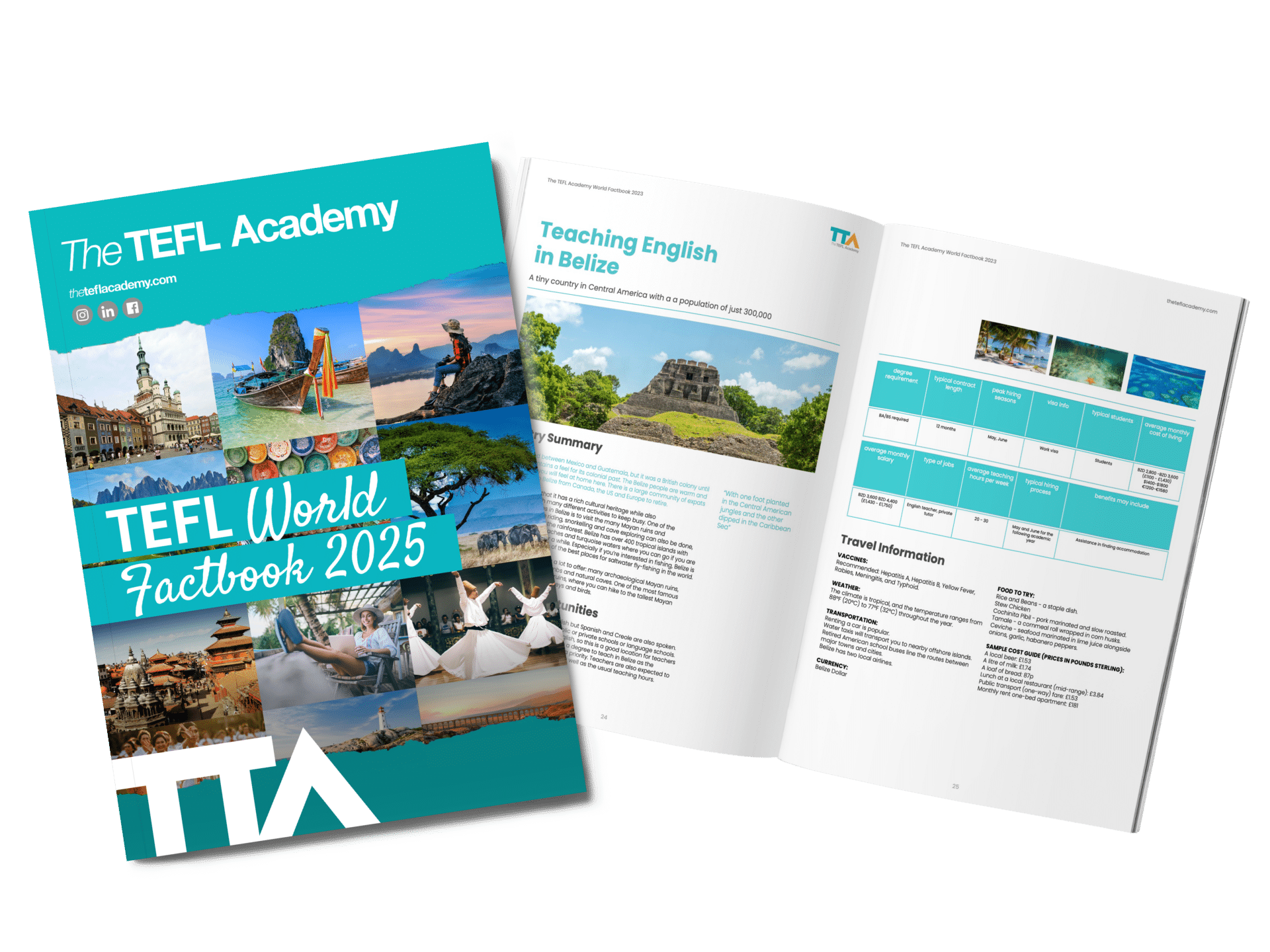Teach English in Tunisia
a world of opportunities
Join a global community of over 200,000 TEFL teachers working throughout the world! Enrol me!
Contents
Teaching opportunities
Teaching requirements
Start your TEFL journey
Tunisia is a country of both natural and man-made beauty. It boasts gorgeous beaches and the stunningly beautiful Sahara Desert, but also the historical site of Carthage. It is the northernmost country in Africa and gained independence from France in 1956. Its recent history was marred by the Tunisian revolution in 2011 – an intensive campaign of mass resistance caused by high unemployment, inflation, corruption and lack of freedom of speech. It was this revolution which inspired the Arab Spring which swept through the Arab world.
Geographically, Tunisia is a long country so environmental differences naturally change from north to south. The south of the country is desert but it is known to snow in some areas in the north. Generally speaking, the country enjoys a mild Mediterranean climate, perfect for spending afternoons shopping in the souk, wandering the ruins of Carthage, drinking jasmine tea or hanging out at one of the beaches. The roman archaeological site of Carthage once was a great trading empire and home to half a million people. Two of the major known components are the Antonin baths, the largest of their kind outside Rome, and the archaeological park next to it. The ruins are scattered through a residential area, so visitors may need to use transportation to visit the other parts, including the Punic ports and tophet, the necropolises, and the amphitheater.
The Medina quarter of Tunis has been a UNESCO World Heritage site since 1979. Medina of Tunis is one of the first Arabo-Muslim towns of the Maghred (698 A.D). This area in the capital of Tunis contains some of 700 monuments, including palaces, mosques, mausoleums, educational institutions, and fountains dating back to the Almohad and Hafisd periods. One of the most remarkable monuments is the Ez-Zitouna Mosque. It’s the oldest mosque in Tunis and covers an impressive area of 1.2 acres. Just north of Tunis you can admire the Mediterranean coastline in the picturesque town of Sidi Bou Said, which is iconic for its traditional houses with white walls and blue doors. The blue and white color was inspired by the palace of Baron Rodlphe d’Erlanger in 1912.
Please note: before travelling to Tunisia, check up-to-date travel advisory warnings. As a result of a number of terrorist threats and attacks, a state of emergency has been declared in Tunisia and it may not be safe for tourists. As of the end of 2016, it is unclear when the state of emergency will be lifted.
Teaching opportunities in Tunisia
The majority of teaching opportunities can be found in Tunis, a cosmopolitan mix of Arab and European cultures with easy access to beaches and the Sahara Desert, or the major tourist destination of Sousse. Jobs can be found in British- or US-run language centres or private universities.
There is a focus on education with the result that Tunisia boasts high literacy rates. Arabic is the official language of Tunisia but French is also widely spoken though not officially recognised – it is used in education, press and business. Tunisians are eager to learn English in order to study abroad or work for international companies – Business and Academic English are popular choices.
Teaching requirements in Tunisia
- Degree Requirement
BA/BS degree required and 1 year teaching preferred - Typical Contract Length
12 Months - Peak Hiring Seasons
Year-round - Visa Info
Work permit - Typical Students
All ages - Average Monthly Cost of Living in Local Currency
1,000-1,200 TND - Average Monthly Salary in Local Currency
2,800-5,800 TND
Start your TEFL journey
Would you like to teach English as a foreign language across the world?
Great! You’re in the right place. The TEFL Academy provides the very best in accredited TEFL courses, meaning your qualification is recognised throughout the world. The TEFL Academy is the world’s leading TEFL course provider. We can help you acquire the skills needed to teach English as a foreign language. Check out our TEFL internships, volunteer placements and the thousands of jobs on our exclusive TEFL jobs board.
Contents
Tunisia is a country of both natural and man-made beauty. It boasts gorgeous beaches and the stunningly beautiful Sahara Desert, but also the historical site of Carthage. It is the northernmost country in Africa and gained independence from France in 1956. Its recent history was marred by the Tunisian revolution in 2011 – an intensive campaign of mass resistance caused by high unemployment, inflation, corruption and lack of freedom of speech. It was this revolution which inspired the Arab Spring which swept through the Arab world.
Geographically, Tunisia is a long country so environmental differences naturally change from north to south. The south of the country is desert but it is known to snow in some areas in the north. Generally speaking, the country enjoys a mild Mediterranean climate, perfect for spending afternoons shopping in the souk, wandering the ruins of Carthage, drinking jasmine tea or hanging out at one of the beaches. The roman archaeological site of Carthage once was a great trading empire and home to half a million people. Two of the major known components are the Antonin baths, the largest of their kind outside Rome, and the archaeological park next to it. The ruins are scattered through a residential area, so visitors may need to use transportation to visit the other parts, including the Punic ports and tophet, the necropolises, and the amphitheater.
The Medina quarter of Tunis has been a UNESCO World Heritage site since 1979. Medina of Tunis is one of the first Arabo-Muslim towns of the Maghred (698 A.D). This area in the capital of Tunis contains some of 700 monuments, including palaces, mosques, mausoleums, educational institutions, and fountains dating back to the Almohad and Hafisd periods. One of the most remarkable monuments is the Ez-Zitouna Mosque. It’s the oldest mosque in Tunis and covers an impressive area of 1.2 acres. Just north of Tunis you can admire the Mediterranean coastline in the picturesque town of Sidi Bou Said, which is iconic for its traditional houses with white walls and blue doors. The blue and white color was inspired by the palace of Baron Rodlphe d’Erlanger in 1912.
Please note: before travelling to Tunisia, check up-to-date travel advisory warnings. As a result of a number of terrorist threats and attacks, a state of emergency has been declared in Tunisia and it may not be safe for tourists. As of the end of 2016, it is unclear when the state of emergency will be lifted.
Teaching opportunities in Tunisia
The majority of teaching opportunities can be found in Tunis, a cosmopolitan mix of Arab and European cultures with easy access to beaches and the Sahara Desert, or the major tourist destination of Sousse. Jobs can be found in British- or US-run language centres or private universities.
There is a focus on education with the result that Tunisia boasts high literacy rates. Arabic is the official language of Tunisia but French is also widely spoken though not officially recognised – it is used in education, press and business. Tunisians are eager to learn English in order to study abroad or work for international companies – Business and Academic English are popular choices.
Teaching requirements in Tunisia
- Degree Requirement
BA/BS degree required and 1 year teaching preferred - Typical Contract Length
12 Months - Peak Hiring Seasons
Year-round - Visa Info
Work permit - Typical Students
All ages - Average Monthly Cost of Living in Local Currency
1,000-1,200 TND - Average Monthly Salary in Local Currency
2,800-5,800 TND
Start your TEFL journey
Would you like to teach English as a foreign language across the world?
Great! You’re in the right place. The TEFL Academy provides the very best in accredited TEFL courses, meaning your qualification is recognised throughout the world. The TEFL Academy is the world’s leading TEFL course provider. We can help you acquire the skills needed to teach English as a foreign language. Check out our TEFL internships, volunteer placements and the thousands of jobs on our exclusive TEFL jobs board.

Download our TEFL Factbook
We have created a unique TEFL World Factbook of teaching abroad guides in over 100 countries to help TEFL teachers decide where in the world to teach English. Each country profile outlines everything a TEFL teacher would need to know including average pay, living costs, working environments and even the weather!
Download TEFL Factbook
Other Places in Africa
View AllTeach English Abroad Articles
View All-
 Resources
ResourcesTeaching On Wall Street English: What You Need To Know
2025-06-30
-
 Resources
ResourcesAwesome English Idioms For EFL Learners – And How To Teach Them
2025-06-27
-
 Teaching English Abroad Jobs
Teaching English Abroad JobsNavigating Culture Shock: My Real Experience Teaching English In Vietnam
2025-06-20
-
 Teaching English Abroad Jobs
Teaching English Abroad JobsThings To Know About Chinese Classroom Culture
2025-06-15
-
 Teaching Online
Teaching OnlineOnline Teaching Platforms You Need To Know
2025-06-13
-
 Teaching English Abroad Jobs
Teaching English Abroad JobsTeaching English in Vietnam: 8 Reasons TEFL Teachers Love Calling Hanoi Home
2025-06-10
 United Kingdom
UK
United Kingdom
UK


































